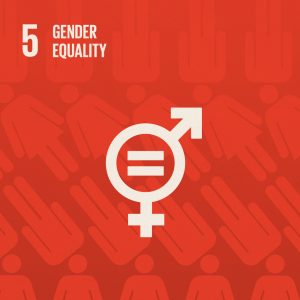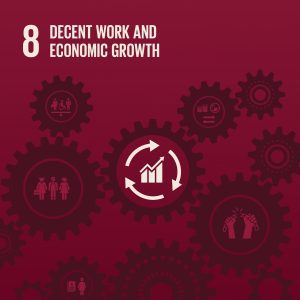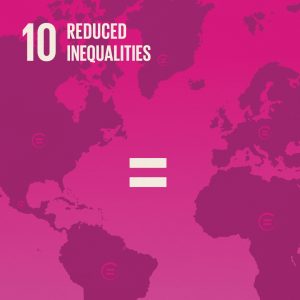By Chloe McMahon. As all of us know, COVID-19 has left an indelible mark on every aspect of our lives. For so many, 2020 has been a year marred by loss, and for others, we have grown increasingly thankful for all we did not lose. Globally, we have mourned the loss of over 2 million individuals, and we will mourn even more before this pandemic ends.
The impact of COVID-19 spreads to our economy, as well. In the United Nations’ 2020 report for their Sustainable Development Goals, they offered a wealth of data indicating that COVID-19 has adversely affected the global economy. Global unemployment has reached an all-time high, and the informal economy has seen wage cuts of nearly 81 percent, which is particularly troubling given the financial hardships informal workers are more likely to face.
Though many quip that the coronavirus is “an equal opportunity virus,” there is a wealth of data that refutes that claim. APM Research Lab found that “Indigenous, Black, and Latino Americans are at least 2.7 times more likely to die [from COVID-19] than their White neighbors. Pacific Islanders were also 2.3 times more likely to die, while Asians experienced just a slight mortality advantage over Whites.” In a study conducted by the Center for Economic and Policy Research, findings showed that 17% of frontline workers were Black, despite making up 11.9% of the overall labor force. Additionally, Black and Latino people also have the highest rates of unemployment during the pandemic by a wide margin, though unemployment for minorities has been consistently higher even before the pandemic.
The cause behind this disparity is a twisted web of structural racism and inequality that dates to the start of the United States. People of color (POC), and particularly Black people, have struggled to gain generational wealth due to discriminatory education and employment practices. The racial disparities in education start from the second a child walks into their first classroom, and they look like a wide range of factors, from school systems with lower funding and higher police presence to schools with fewer non-white faculty. Education gaps mean that fewer POC individuals have the opportunity to obtain degrees that even get their foot in the door to well-paying jobs with benefits and enough income to create a wealth cushion. When considered for well-paying positions, however, discrimination is still an issue. Multiple studies support the claim that Black people face discrimination during hiring processes, and many economists claim Black workers experience a “first fired, last hired” phenomenon. This, as well as other factors such as the wage gap and lower rates of home ownership means that Black Americans face serious disadvantages in our economy and workforce.
When discussing issues of discrimination in the workforce and economy, Auburn University’s Office of Inclusion and Diversity (OID) stated that “COVID-19 revealed barriers and inequities that have always been present in our society.” If this virus has indeed brought to the forefront of our political consciousness this disparity, we must ask ourselves what tools are available to us to remedy it. OID believes that it starts with making equity a central tenant of our organizational structures. To this point, they said, “From living wages to flexible work hours, we have great work to do to create equitable working conditions.”
Tasked with facilitating inclusion and diversity on campus, OID also prepares its students for careers post-college, locating students with opportunities to excel. OID tackles this tall order through many different approaches. They work with corporate partners to ensure that their company culture is open and welcoming. They also offer resume and interview workshops in collaboration with corporate partners, Alumni Affairs, and the Career Center. OID even runs a Tiger Excellence Scholars Program that offers meaningful professional development opportunities for students.
OID recognizes that we have not yet achieved a truly equitable society, and the workforce is not exempt from that. Citing such historical events as Post-Reconstruction, the lack of anti-discrimination housing laws post-World War II, and landmark cases like Plessy v Ferguson and Brown v Board, OID asserts that “The wealth gap has persisted for generations as a result of oppressive systems that have been in place for hundreds of years.”
In a time where this global pandemic has raged on amidst highly visible cases of police brutality and the ensuing protests against it, our nation has come to a point where it must ask itself: can we sustain our nation with our current practices, systems, and values, or is it time that we address that our nation has not yet seen equality achieved? If we hope to press forward into a nation that truly values equity and sustainability, we must address the way that our economy and workforce perpetuate oppressive systems against people of color.
Post Contributed by Chloe McMahon, Program Coordinator, Office of Sustainability
Learn about the SDGs & AU and our contributions related to this post.







